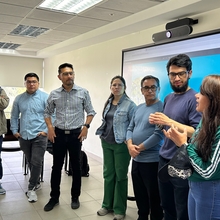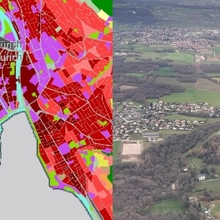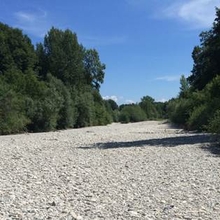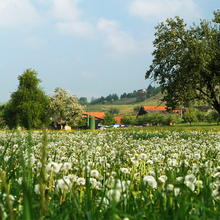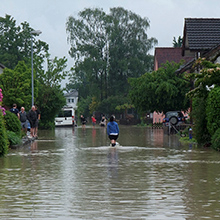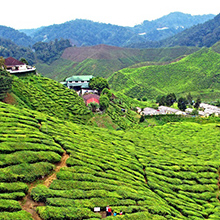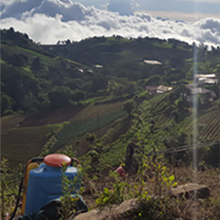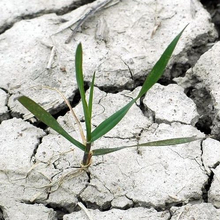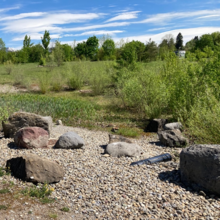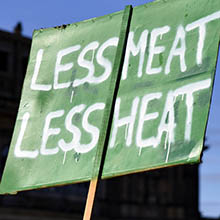Department Environmental Social Sciences
Policy Analysis and Environmental Governance (PEGO)

Research in the group Policy Analysis and Environmental Governance (PEGO) is driven by current complex environmental and societal challenges. These include the integration of different aspects of water resource management; the drivers and impacts of climate change; and the transition toward a clean energy system.
We utilize policy process theories, institutional analysis and multi-level governance frameworks to study a wide variety of substantial issues. Typical examples are innovative and effective policy design, instrument choice under uncertainty, and the integration of actors from different spatial scales or levels and stages of the policy process.
We adopt a strong methodological focus on approaches that analyze and model social networks. We combine these approaches with other quantitative and qualitative methods such as discourse analysis, qualitative comparative analysis and multicriteria decision analysis.
PEGO holds an affiliation to the Chair of Environmental Policy Analysis at the University of Bern.
Projects
Past projects
Team
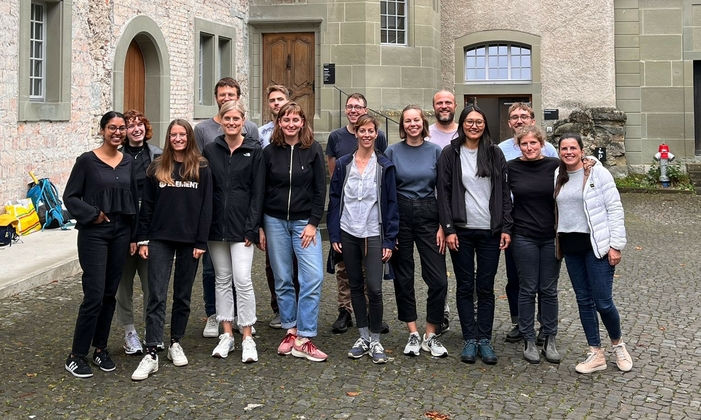
University of Berne
Publications
Publications 2024
Publications 2023
Publications 2022
Publications 2021
Publications 2020
Publications 2019
Topics master thesis
PEGO is looking for students doing their MA or BA thesis on one of the following issues:
Wastewater reuse: Today, reuse of treated wastewater in Switzerland is not compatible with legislation or not even regulated by law. However, there are reasons to think about the opportunities and risks of reuse also in Switzerland, as the availability of water resources and demand for irrigation will change in the next decades due to climate change. The master thesis will investigate the question to what extent water reuse is socially and politically accepted and considered legitimate in Switzerland. An in-depth analysis of the current institutional and political environment of the idea is an important condition to understand under which circumstances a change of practice and legislation and an implementation of innovative water reuse in Switzerland would be possible. Specifically, the master thesis addresses one or different dimensions of political and/or social legitimacy. These may be political, discursive, regulatory, cultural or other. The thesis may further address what factors influence legitimacy and how they change over time, and how current barriers in broader legitimacy might be overcome.
Network analysis ‘Future of Food Switzerland’. SDSN and the research group Pego (Eawag / Uni Bern) are looking for a student to develop a network analysis that analyzes the complex interactions of actors influencing what goes from farm to fork, in the context of a final thesis (Masters, or potentially also Bachelors). The analysis should identify clusters of actors pursuing common goals, as well as brokers for solutions. Based on the approach of social-ecological network analysis, the structure of the problem area of the food system will be analyzed, and the student will study which stakeholders might want to collaborate based on joint or interdependent issues, in order to improve the fit between the problem and stakeholder networks.
Biodiversity politics in Swiss Parliament. Preserving and promoting biodiversity is a politically anchored goal in Switzerland. It affects various policy fields such as water protection, forests and the environment, but also spatial planning and health. There are therefore countless parliamentary initiatives and acts dealing with biodiversity in a narrower or broader sense. We have collected documents around these initiatives and actors covering the period of the last 20 years. They are available in a text corpus for manual or automated content analysis. The following research questions could be interesting to follow: How has the political agenda with regard to biodiversity changed since 2000? Which actors are mainly concerned with the protection of species and landscapes, as well as the protection of genetic diversity? What kind of (changing) coalitions among actors are there? And which aspects do the actors and related documents emphasize or ignore?
Analysis of Swiss energy policy instruments: Actor coalitions over time. The decarbonization of the energy sector is a central issue in fighting climate change. Policy instruments can foster such a decarbonization. Such instruments should ideally persist over time in order to deploy their effects, but they also need to be capable of adapting to the inherent dynamics of technological change in this domain. We are looking for a Master student with a strong interest in Swiss climate and energy policy. The MA thesis is expected to cover the analysis of a given policy in the Swiss energy sector over time (several years to a decade). From a methodological point of view, the thesis should rely on Discourse Network Analysis (DNA) in order to reveal the positions and arguments of the most central political actors with respect to the design of such policy instruments. Potential topics are the feed-in tariffs or CO2 taxation, but other relevant and long-term policies can also be analyzed. A comparison with data from Germany is also possible. The thesis will be co-directed by Manuel Fischer (Policy Analysis and Environmental Governance group at Eawag and University of Bern) and the Energy Politics Group at ETH Zurich.
Governance of alluvial plains: The governance of alluvial plains is complex. Different organizations from the public sector, civil society and private firms with different responsibilites and preferences interact in and around alluvial plains. Further, the governance of alluvial plains involves a host of interdependent issues, which have to be balanced. Mostly, these issues revolves around questions of flood management, nature protection and agricultural production. In a project led by Manuel Fischer at Eawag we utilize social-ecological network models to understand the governance of alluvial plains and identify crucial factors for successful governance. To do so, we compare 10-12 alluvial plains throughout Switzerland. The master thesis will include working with us within the project and the responsibility for gathering data (mostly through stakeholder interviews) and a thorough analysis of one or more cases. We offen a nice and active working environment within our project team, the possibility to work in an exciting new research field, and close supervision of the thesis work. Depending on the interest of the master student, employment as a scientific assistant at Eawag in Dübendorf is possible. We specifically look for a French-speaking person who is interested in environmental topics. If beavers, federalism, residual flows, and policy do not sound completely foreign to you, we would be excited to hear from you.
Biodiversity as a complex policy field: The prospective MA thesis deals with the complex actor constellation around biodiversity. Biodiversity concerns many different traditional policy sectors (water, forest, energy, land use planning, agriculture, etc.) and is influenced by policy processes (“Strategie Biodiversität”) on different levels of decision-making (from municipalities to international treaties). Theoretical approaches on policy processes and policy networks should guide the empirical analysis of the actor constellation in this field.
Competence shifts to municipality associations: Municipalities are the lowest level in the Swiss multi-level system of political decision-making. They are under increasing pressure, given the challenges provided by technical developments in – for example – the infrastructure domain. One solution for municipalities to deal with these challenges and related lack of resources and expertise is to delegate certain competencies to municipality associations. The prospective MA thesis deals with the question why such shifts of competences are accepted or not by municipalities, and under what context conditions they are successful or not. The thesis analyses this question for the domain of wastewater and drinking water.
Privatization of drinking water: The population of the canton of Zurich will soon vote on the revision of the integrated cantonal water law. The main reason for the high public interest and the conflictive discussions around the revision of this law is due to the fact that an element in the law explicitly provides the option for private firms to acquire parts of the drinking water supply system. The discussions in the canton of Zurich might very well influence related discussions in other cantons. The prospective MA thesis analyses the policy process and the actor network around the revision of the Zurich water law, as well as actors’ preferences and strategies around the question of privatisation of water supply against the background of policy process and network theories.
Protection of deep groundwater: Deep groundwater is increasingly concerned by different uses such as the extraction of mineral water, geo-thermical drillings, future CO2 storage as well as the agricultural use of water due to climate change. The protection and the related coordination of uses (as for example through prioritizing given types of uses) needs to be adapted to these new challenges in order to prevent future problems in regulation and uncertainties for users. The prospective MA thesis prepares basic parameters related to this issue and identifies and critically evaluates relevant actors, interests, conflicts, opportunities for coordination and policy instruments related to the protection of deep groundwater.
River restoration in Switzerland: Comparing cantonal strategies: In the next decades, Switzerland will restore (revitalize) an important part of its rivers. While the goals and basic criteria and financing mechanisms are defined at the national level, cantons are mainly responsible for identifying the river parts which should be restored. Swiss cantons thereby encounter different political and geographical challenges, and, as a consequence, organize their strategic planning of restoration measures in different ways, and rely on different criteria. Given the long-term task of restoring rivers, knowing how cantons plan their measures, and thus allowing for cross-cantonal learning over time, is crucial. The aim of the MA thesis is to compare cantonal planning processes, resources, approaches, and actor constellations related to restoration planning, and thus to identify why given types of cantons act in specific ways. Qualitative Comparative Analysis (QCA) might be a good methodological approach for such a comparison. (German knowledge required)
Partner & Communities
Partner in Science (Switzerland)
Institut für Politikwissenschaft, Universität Bern
Oeschger Zentrum für Klimaforschung, Universität Bern
Center for Development and Environment, Universität Bern
Gruppe Politik Natürlicher Ressourcen, ETHZ
Social Networks Lab, ETHZ
Group for Sustainability and Technology (SusTec), ETHZ
Wirtschafts- und Sozialwissenschaften, WSL
Département de science politique et relations internationales, Université de Genève
Gouvernance de l’environnement et développement territorial, Université de Genève



